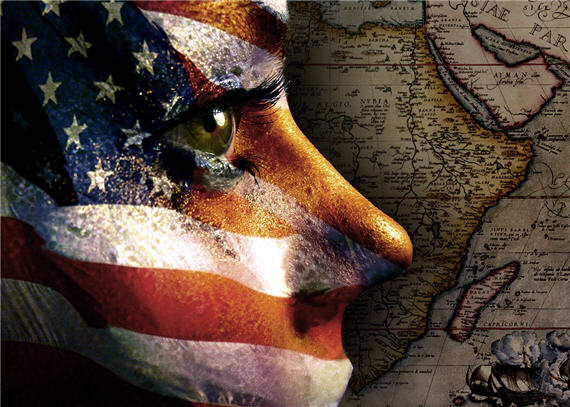Ivory Coast By Any Other Name …
Is calling Côte d'Ivoire "Ivory Coast" linguistic colonialism? Where do we draw the line when English names for countries go out of vogue?
The bizarre goings on in Ivory Coast, in which Laurent Gbagbo is refusing to step down from the presidency despite losing an election and thus civil war seems quite likely, has brought the seldom-talked-about-in-America country into the news. And some, including Chris Albon, are wondering why the hell American newspapers such as NYT continue to call the place “Ivory Coast” despite the country’s being named “Republic of Côte d’Ivoire” and the government’s having insisted for more than a quarter century that we call it “Côte d’Ivoire” rather than the colonial era “Ivory Coast.”
My initial response: “What else would they call it: They’re an English language newspaper.”
When several others, including Kurt Schlichter, Jayvie Canono, and Josh Trevino concurred, Albon jokingly accused us of “Linguistic colonialism.”
My general rule on these matters is that, when a longstanding English name for a place exists, we should use it. That’s doubly true when the local name is hard to say in English and exponentially so if it can’t be spelled without digging out special characters not on the standard English keyboard. We call Germany “Germany,” not “Deutschland.” Ditto “Florence” vice “Firenze,” “Munich” vice “München,” and so forth and so on.
But how far should we take this? Schlichter chimed in with “To me, Burkina Faso always was and always will be Upper Volta.” To which Trevino added, “And Rhodesia, please.” Canono wondered, “[I]s it still okay to call it ‘Burma’ and not the militarily-decreed ‘Myanmar?'”
I don’t have a hard and fast rule that covers all these cases. Typically, when there’s a genuine renaming of a place, as happened in the first two of these examples, my tendency is to go along with the new name. “Burkina Faso” is as different from “Upper Volta” is “Muhammed Ali” is from “Cassius Clay.” That “Burkina Faso” and “Zimbabwe” are easy enough to pronounce and write in English makes that choice easier, as does the fact that my government and all the major press have gone along with the transition.
Burma/Myanmar is a distinct case, however. “Burma” is a British bastardization of “Bamar,” which is a local variant of “Myanmar.” The military government issued new English translations in 1989 and insisted on “Myanmar” as the proper address. Some governments and most press agencies have complied. Others have not. The United Nations almost instantly recognized it as did most developing world countries. The United States, UK, Australia, Canada, and France have not. I’ve generally followed the Anglophone practice of ignoring the wishes of the Burmese government on the name change, although I do sometimes use it since I see it so often in the American press.






Haven’t we had this discussion before? In my view when there is an established English language name for a place we should use it. Otherwise an English approximation of the place name used by those who live there is the most appropriate. Doing otherwise is not only an affectation, it’s obfuscatory.
In my understanding “Burma” isn’t that bad a bastardization when pronounced as the British who devised the name would have, something approximating “Buh-muh”. Further, it’s my understanding that “Myanmar” is a political statement, catering to a particular ethnic group with the country. That’s similar to calling Bombay “Mumbai”, an attempt to cloak the Portuguese roots of the place name in revisionism.
Should we say Pah-ree? Roma? Moskva? Loh-uh-vihl?
Firenze, not Fiorenze. 😉
To the extent that anything ever is, this is something of a “hot topic” in cartography and geography. The current fashion is to use the native name whenever possible, i.e. except when it is nearly unpronounceable in English or doesn’t translate into the Latin alphabet.
To wit, just about everyone says “Mumbai” now instead of “Bombay”, etc. You won’t find “Munich” on Google Maps, only Munchen. There’s a major correction underway.
Here’s a very lengthy article on how to decide whether to use the local or the English version of place names in Wikipedia articles:
http://en.wikipedia.org/wiki/Wikipedia:Naming_conventions_(geographic_names)
It’s not necessarily a silly question, either. For instance whether you say “Gdansk” or “Danzig” for the Polish city says a lot about your ethnicity and your views on WW2 reparations. Same with “Derry” vs. “Londonderry” although there isn’t a language issue there. Ivorians are likely to see an Anglophone who refuses to use the French as either provincial or not taking them seriously.
@Dave,
In many cases the English version of a foreign name, for instance “Vienna” in place of “Wien”, came about because our medieval forefathers were having trouble keeping the pronunciation and spelling of the foreign word worked out. So using a “V” was a necessary crutch.
The emerging consensus is that if you don’t need the crutch you shouldn’t use it. People should be allowed to decide how they’re referred to, just as you might expect a Spanish-speaker to call you “DAY-vid” and not “Da-VEED”.
I think the BBC and the British government is not going to call Burma “Myanmar” until they feel that there is a legitimate government, and then they will call it what the government asks. At least for the Beeb, its a principle thing.
I kinda like the French name, Côte d’Ivoire. But I think it is a bit much to ask an English speaking world which calls Deutchland “Germany”, to use the French name in day to day usage. Diplomatically, it makes sense to call it Côte d’Ivoire. But in news reports, that’s probably not going to catch on.
When in Rome… I think that people are entitled to call things anything they care to in their own languages just as we are in ours.
It seems to me that since “Côte d’Ivoire” is French, referring to a country in Africa by that name is st least as colonial as calling it “Ivory Coast.” Especially considering that it is a literal translation thereof. Might as well insist on Spanish speakers calling the USA “The United States of America” rather than “Los Estados Unidos de America.”
If they wanted a non-colonial name they should have done what Ghana did and come up with a native-language or indigenous name.
@Dave,
You’re certainly “entitled” to call anyone anything, in the sense that you won’t get thrown in prison. But if you’re in a position where manners are important or you’re dealing with people who don’t have the same background as you- in both cases, where the NYT finds itself- it may well behoove you to refer to a group of people in the way they prefer.
I’m not saying that you’re a rube if you don’t roll your r’s in “Costa Rica”. It does come off as affected if you try to hard. But at the same time I think you should be open to let the people you’re referring to decide either 1) in French it’s “Cote d’Iviore”, but in English, “Ivory Coast” is fine, or 2) we’d like for you to take a stab at “Cote d’Iviore” regardless of what language you speak. It’s a matter of respect IMO.
@B Minich – I distinctly remember the BBC announcers on the World Service calling it “Myanmar” in all the news about that country, including recently when Aung Sang Suu Kyi was released.
@Andre: “Firenze, not Fiorenze. ;-)”
Fixed, although the latter is technically a correct (if largely obsolete) variant. Oddly, I had it misspelled and Firefox’ spell checker suggested the latter.
“To wit, just about everyone says “Mumbai” now instead of “Bombay”, etc. You won’t find “Munich” on Google Maps, only Munchen. There’s a major correction underway.”
I guess that depends on who you mean by “everyone” and what your goal is. If it’s to create a foreign-language enriched information structure accessible primarily by linguists and cartographers, I have to wonder why one would set out to make it more difficult to access names, is it to make Americans more insular of their knowledge of the world? Or is it to increase the need for language and geography majors?
Speaking for myself, few things are as annoying as having read the name of a city or province in a novel, history book or article and reach for my atlas to learn a little about the place and find that I must “see” some other entry that consists of non-roman letters, symbols and discordant letter combinations. Often I need to write down the new entry because I can’t retain the odd language structure as I scan down pages of similar words in small print. See, my book has used some anglicized name to make reading and recognition comfortable, my atlas wants to educate me on a language I am not going to learn.
“To wit, just about everyone says “Mumbai” now instead of “Bombay”, etc. You won’t find “Munich” on Google Maps, only Munchen. There’s a major correction underway.”
On the other hand, the country Muenchen is found in is still called Germany rather than Deutschland in English countries, Austria rather than Oesterreich, Vienna rather than Wien … though I note that its now the Netherlands rather than Holland, which is pretty close.
The Belgians have you all beat with confusing highway signs with names in three languages, which one is used depends on where you are. In Francophone Wallonia, you have signs for Bruxelles, Louvain, Namur, Liege. In Flemish Flanders, the same cities are Brussel, Leuven, Namen, and Luik.
The one I found funny was NBC’s coverage of the winter Olympics in Turin, they would always use the Italian spelling of Torino, but the English spelling for Italy.
if I have it right, most of the prime African Ivory actually came from the east coast of Africa – old Tanganyika to Zanzibar (now Tanzania) It was heavily processed in anti-slavery Connecticut (That Yankee craftsman engenuity created a machine that could cut deliate piano key veneers) Ivorytown and Deep river were the center of the trade with Ivorytown – the USA’s first planned company town- being created for the task. It was estimated that each elephant tusk cost up to five black lives.(And the North blamed the south for cruely to slaves -but like abortion, the evil wasn’t seen here, so even today the lie is taught in schools. The entire operation was run by the Omani Sultans under British protection* and was largely financed by Hindus.
(*Eventually Victoria stopped the slave trade – she also was behind helping escaped slaves in America go free if they could reach Canada)
A quick sampling of the online presence of Ivorian media sites shows that they refer to this country systematically as Les États-Unis? Shoud we be offended? Should we demand that the refer to us solely as “The United States of America”? I don’t think so but the logic of some in this comment thread would seem to demand it.
@Dave,
The logic is that the US should have the right to decide whether they prefer to emphasize the meaning of the words by allowing them to be translated or the historical/cultural/etc. aspects of the words by insisting on English.
If, for some reason, Congress passed a resolution saying that “United States” was “United States” even in Spanish-speaking countries, then yes, we could be offended if Peruvians decided to keep calling us Los Estados Unidos. But Congress hasn’t done that so it’s perfectly fine for other people to do as they choose.
I’m puzzled by the notion that the U. S. Congress has any power over foreign citizens in their own countries.
@Dave,
Why do you insist on turning this into a legal issue? Of course there’s no power. (Note I said resolution, not law.) But the Congress does speak for us to an extent. If they said that, in their opinion, the words “United States of America” should not be rendered into the local language when referring to the USA, the best and most accurate foreign atlases and news sources would heed their request. Ignorant or provincial foreigners would keep using “Etats-Unis” or whatever.
However, Congress has not done so, preferring to let foreigners translate the words so that the meaning of “united states” is preserved instead of the collection of sounds.
Cote d’Ivoire went the other route, apparently, and want their name to conjure their French heritage more than they care if people understand that ivory was once unloaded on the shore. Again, the best and most accurate American atlases and news sources will and ought to heed their request. Ignorant or provincial Americans will keep right on saying “Ivory Coast”.
There’s a surprisingly common attitude among Americans that’s stupefying to the rest of the world, and embarrassing to those of us who don’t share it, that simply acceding to another nation’s/group’s/person’s idea of politeness and courtesy is some kind of submission.
Exhibit A: the simultaneous strokes that people suffered when they saw Obama (gasp) making a (double gasp) nice gesture to a (triple gasp) Saudi royal in public.
The line of thinking goes that I always used to call it Peking in school, and now if the Chinese people mention that they’d like it known as Beijing, I can’t go along with that because somehow that would make them the boss of me or something and heaven forbid we ever let it look like that’s the case.
If your neighbor comes over to say that they’d like it if you kept the noise down when you’re having BBQ’s, is your first response to consider how you might move the radio or do you immediately consult the homeowners association bylaws?
I’m curious as to how much of this argument is just an American argument, in an embarrassingly provincial nation. (I say this as an expatriate US Citizen.)
Of course its Côte d’Ivoire. This is common usage in the English world today, as is Mumbai, Gdansk, Derry and Beijing. It’s the language of educated, globalised English speakers. The Wikipedia calls it Côte d’Ivoire. The CIA Factbook calls it Côte d’Ivoire. The Harvard International Review calls it Côte d’Ivoire.
The reason some Americans still call it Ivory Coast, is the same reason that some Americans are dragging their heels on global warming, gay rights, human rights… and accepting the fact that that on must human development indicators, the US is a middle-ranked, not leading OECD country: American provincialism, living wistifully back in the “American Century.”
Côte d’Ivoire is future usage. Ivory Coast is past usage.
Sad.
The country’s official name is not the Republic of Cote d’Ivoire (sorry I don’t know how to make accents on this computer). Its official name la Republique de Cote d’Ivoire.
I’ve never seen the NYT or any other English language news outlet refer to Guinee or to Tchad or to Suisse, Belgique or Andorre. They never uses the French acronyms RCA (Central African Republic) or RDC (Democratic Republic of the Congo). Why should it refer to Cote d’Ivoire?
With all that’s going on there, this is even more trivial than it would otherwise be.
It cracks me up that some of the above commenters seem serious about extrapolating this minor issue into something more significant. In betraying this ‘unique’ American provincialism, they ignorantly don’t realize that, from what I can tell, most major non-American media outlets in Britain, Canada, Australia, etc. seem to refer to this country as Ivory Coast as well. Why? Because they are ENGLISH language newspapers and Ivory and Coast are English words while Cote, d’ and Ivoire are French words.
But I guess when you live in an ivory tower… oops I mean… when you live in une tour d’ivoire, you have the luxury of sniffingly ranting about such nothingness because you’re not dealing first hand with rampant xenophobia, killings and massive human rights abuses.
Pathetique.
I’m not sure of the logic in that last “comment”. If you *are* dealing with humans rights abuses on a daily basis (and let’s face it, who among the OTB commentariat isn’t) then you *are* allowed to ignore the common courtesy of calling people by the name they prefer? Or you’re aren’t? Or you are, in theory, but you wouldn’t?
I understand that it’s human nature to be stubborn when you’re exposed as a fool. Why we’re turning this into being about elitism is beyond me. Unless only the old-moneyed blue bloods are supposed to have people skills anymore.